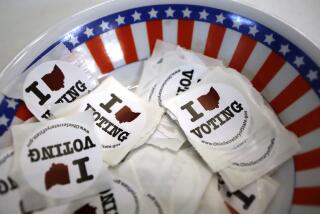In Ohio, presidential election won’t be swayed by wedge issues
CINCINNATI, Ohio – In this battleground state that has seen wedge issues enter into presidential politics in the past, this election year lacks such a sideshow.
In 2004, many believed a ballot measure outlawing gay marriage played an important role in helping President George W. Bush win Ohio, a bellwether state in most presidential elections. No Republican has won the White House without winning Ohio.
In a squeaker, Bush beat Massachusetts Sen. John Kerry with a 2.1 percentage point margin of victory, or 118,775 votes out of nearly 5.6 million cast. Had Kerry earned a mere 60,000 more votes here, moaned Democrats, he would have been the nation’s 44th president.
Of course, had that happened, there would have been a Democratic incumbent in 2008 instead of a wide-open race between Obama and Arizona Sen. John McCain. And who knows what kind of “Butterfly Effect” scenarios we’d be looking at today: Vice President John Edwards might be coasting toward the Democratic presidential nomination. You wouldn’t even recognize the names Bristol and Tripp!
While it is has become conventional wisdom the gay marriage ban was responsible for Ohio’s unprecedented 72% turnout and Bush’s subsequent victory, it turns out neither side here fully embraces that version of events.
As Aaron Marshall of the Cleveland Plain Dealer reported Tuesday, Ohio’s GOP Chairman Bob Bennett told him the gay marriage ban was given too much credit for the Bush win, though it may have galvanized some evangelicals in Southern Ohio. Democrat Brian Rothenberg of Progress Ohio said it was Bush voters who helped the gay marriage ban to victory, “not the other way around.”
To be sure, some other swing states will be serving up polarizing ballot initiatives. In Florida, voters will decide on a constitutional amendment that would ban any public funds being used for health policies that include abortion coverage. In Colorado, they will decide whether to legalize marijuana for recreational use.
Here in Ohio, the absence of hot-button issues on this November’s ballot was not for lack of effort, Marshall reported.
“While groups are collecting signatures in Ohio for issues that could add spice to future elections — a medical marijuana question, an amendment declaring a fertilized egg a person and a repeal of the state’s ban on gay marriage — none made it off the launching pad for this year’s ballot,” he wrote.
Here in the Buckeye state, former Massachusetts Gov. Mitt Romney and President Obama will have to rely on their get-out-the-vote operations, and, of course, unrestrained advertising spending by outside groups. What promises to be an unparalleled blitz of political ads already has begun.
Follow Politics Now on Twitter
Twitter: @robinabcarian
More to Read
Get the L.A. Times Politics newsletter
Deeply reported insights into legislation, politics and policy from Sacramento, Washington and beyond. In your inbox three times per week.
You may occasionally receive promotional content from the Los Angeles Times.








